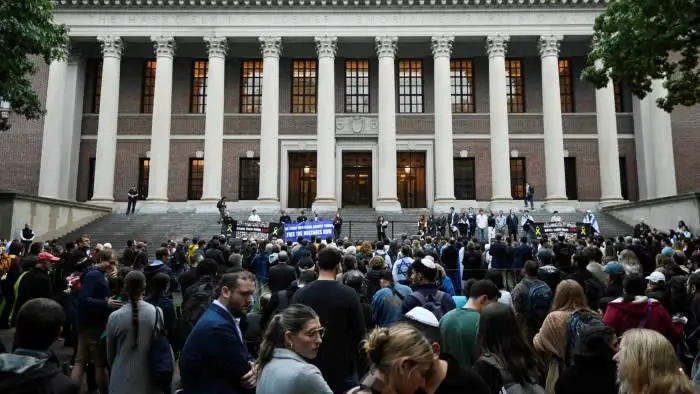Harvard donations drop sharply in wake of criticism over Israel protests

Access the Editor's Digest at no cost.
Roula Khalaf, the Editor of the Financial Times, shares her top story picks in this weekly newsletter.
Contributions to Harvard University dropped by 14% in the fiscal year that concluded on June 30. This decline came as major donors distanced themselves from the university, and influential alumni from the finance sector voiced their disapproval of the administration's handling of protests related to the Israel-Palestinian conflict.
Overall donations to the richest university in the Western world fell to $896 million, down from $1.05 billion last year, following backlash over campus protests that resulted in the resignation of President Claudine Gay.
The decline was solely seen in contributions to the university's endowment, where the biggest donations are usually found. These contributions decreased by a third, while donations for the operating fund, which pays for daily expenses, increased by 9 percent compared to the previous year, reaching $528 million.
Harvard officials have not yet replied to a request for a comment. However, the university referred to a statement made by President Alan Garber on Thursday to its internal news outlet, in which he noted that "alumni and other supporters have shown their concern and commitment to the future of the university through increased contributions throughout the year."
Student demonstrations regarding Israel's reaction to Hamas's attack on October 7, 2023, stirred significant unrest on the Cambridge campus throughout much of the previous academic year. Wealthy alumni expressed their discontent with the university's management of these protests. Hedge fund manager Bill Ackman was particularly vocal in his calls for the removal of the university's president, while Ken Griffin, the founder of Citadel and a prominent donor, encouraged the institution to uphold "western values."
Despite a decline in donations, the school’s endowment saw a positive return of 9.6 percent. This increase brought the total value back up to $53.2 billion, roughly where it was in June 2021, just before Russia launched its full-scale invasion of Ukraine, which caused a drop in both the endowment and the public equity and bond markets.
The 2024 results fell short of the 10.1 percent average returns reported for US colleges and universities by Cambridge Associates, but they surpassed Harvard's annual target return of 8 percent. This target is significantly lower than the returns achieved by nearly all of Harvard’s Ivy League counterparts over the last decade.
The university is adopting a cautious investment strategy since its endowment now supports almost 40% of Harvard's budget, an increase from 31% a decade ago.
In a message sharing the results, Narv Narvekar, CEO of Harvard Management Company, which oversees the endowment, stated that while the focus has been on achieving robust investment returns, there is also a crucial need to maintain budget stability.
Private equity, which represents the largest part of HMC’s investment portfolio, has underperformed compared to public equity for the second consecutive year. This decline is attributed to a decrease in stock market listings and fewer mergers and acquisitions, putting pressure on this asset category.
In the letter, Narvekar mentioned that the private equity investments managed by HMC didn't do well partly because the portfolio managers failed to significantly lower their valuations during the market crash in 2022. Additionally, they did not adjust their investment values upward even as public equity markets began to improve in 2023 and 2024.
Since Narvekar took charge in 2016, HMC's investment in private equity has more than doubled, reaching 39 percent of its total assets.
Roger Vincent, the founder of Summation Capital and a former senior investment officer for Cornell University's endowment, expressed that he was "fairly impressed" with the one-year performance of the Harvard endowment. He noted that it performed better than several of its Ivy League counterparts that have "comparable portfolio setups".
"Although investing heavily in alternative and illiquid assets has resulted in seemingly strong returns, those results are only meaningful if they hold up over a longer period."









































